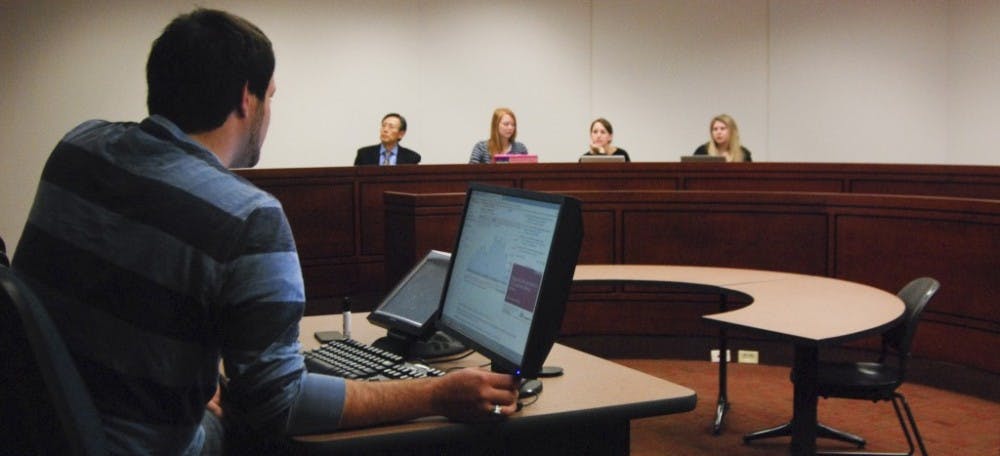At a university where engaged learning is a primary focus, finding the means to manage an investment portfolio as an undergraduate can be a difficult task for students aspiring to be professionals in the financial services industry.
But such an opportunity is afforded to a select group of students at Elon University — the business fellows — some of which selected the school largely for the portfolio management program.
David Campbell, a senior double major in finance and accounting, was one of those students attracted to Elon because of the opportunity to manage a portion of the university’s endowment.
Campbell is one of eight business fellows enrolled in the two-semester senior investment course. The other senior business fellows take part in a management and marketing project.
“I got accepted into other schools, but one of the main reasons I came to Elon was being offered an opportunity to do this,” said Campbell, who started investing at age 15.
Elon is not alone in offering certain undergraduate students a chance to be a part of the university’s investment strategies, however Campbell said programs for undergraduates at other schools don’t guarantee such a hands-on experience.
“At a lot of institutions, the students are mostly analysts for the endowment money they’re given,” he said. “They don’t get to make actual decisions, just recommendations.”
Wonhi Synn, professor of finance and chair of the finance department, helped initiate the program at Elon in 1992 when the Board of Trustees accepted his proposal to allow students to manage part of the endowment. A last minute decision, Synn handpicked nine students who would manage the $30,000 allotted from the endowment.
After a successful first year, the course became the project of senior business fellows who had taken prerequisite finance courses.
The Board of Trustees increased the group’s funds to $100,000 in 2006, by which time the successive business fellows classes had grown the portfolio to around $65,000.
Today, the senior business fellows manage around $163,000 in the investment class, a tenth of a percent of the university’s $140 million endowment. Though Elon has doubled its endowment since 2006, compared to other universities, the endowment is still relatively low, said Jim Piatt, vice president for university advancement.
But despite having a smaller amount of money to manage, Synn said undergraduate students at Elon may come out with more experience than students at larger universities.
“There’s a big difference among most schools, especially big schools where there is a lot more money,” Synn said. “Most undergraduate students at those schools are working as analysts to produce research reports, and the decision-making party consists of faculty and outside investors.”
Senior Jacqueline Evans, an accounting and international business double major, said the money allotted to the student investment group was plenty to give the class hands-on experience.
“It is the perfect amount, as it allows us to choose multiple stocks in various sectors while maintaining a substantial cash balance,” Evans said.
Synn said Elon was one of the first undergraduate schools to start such a program in the 1990s, but today hundreds of schools provide opportunities for business students to have a say in university investments.
“All the big schools have these programs,” he said. “At most schools, the managers (of the portfolio) are MBA students.”
At Elon, the business fellows in the two-semester, two-credit-hour investment class meet twice a week under the supervision of Synn.
“It’s really up to the class on how we do things,” Campbell said. “We decided to break it down so each person has one or two sectors they keep up with and report on how that market is doing.”
Campbell said members of the class go around the room and discuss how their investments are doing and whether they should sell any stocks. A board on the wall of the classroom, visible to anyone walking by on the first floor of Koury Business Center, shows daily losses and gains of some of their stocks.
“It’s an awesome talking point in an interview,” Campbell said. “If I bring up the point I helped manage a $160,000 portfolio, that’s going to draw a lot of attention.”
Synn said the group has never experienced signficant losses on its investments. Though the class aims to generate a positive return on their investments and beat the S&P 500, an index based on the common stock prices of the top 500 publicly traded companies, Synn said the main purpose of the class is for students to have real-world investment experience.
“From the university’s point of view, it’s not about making money, but providing an opportunity for students to work on a challenging project as a small group and learn how to work as a team,” Synn said. “It’s not an easy project and they expect to do a lot more homework and their own research. Even though it’s two credit hours, there’s probably more work than if it were four credit hours.”


